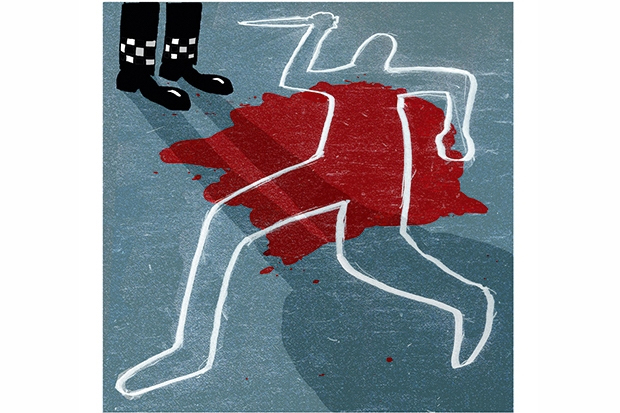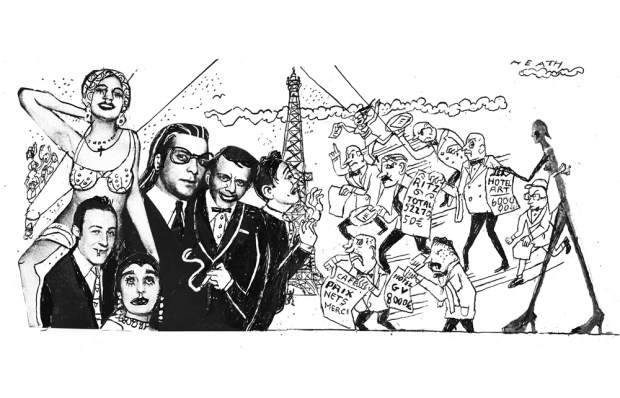What can the EU do to help the Britons out of their Brexit quagmire? Until very recently, the answer would have been ‘little, if anything’. There is a deal on the table, which Theresa May herself pronounced to be non-negotiable. Well, parliament directed her — and by implication, the EU — to think again and to reconsider the vexed question of the Irish backstop. Does anybody on either side of the channel really want to wreck the future relationship between the UK and the EU over the unsolved issue of the Irish border, as well as risk creating renewed enmity along it? God forbid.
The EU’s reluctance to come forward with a compromise is of course rooted in the inability of Europeans to understand the existential drive behind the British wish to leave in the first place. They simply can’t conceive of their British partner, so beloved across a hugely Anglophile continent, wanting to ditch its cosy alliance for the purpose of going it alone again in the world.
Everybody was somehow goaded into thinking that the term EU makes for a joint identity, erasing intrinsic differences of national characteristics. Wrong. There remains a significant gulf between the sceptered isle and the continental approach to history. A seafaring nation and continentals sing from quite different hymn sheets.
On the eve of Trafalgar Lord Nelson told his captains, ‘Something has to be left to chance. Nothing is certain in a sea fight.’ The English, wrote Orwell, are ‘inveterate gamblers.’ It boils down to the same thing. On the high seas you have to trust to fortune as well as to your skills and your confidence in this blessed plot. The British character emerged from a combination of guts and risk-taking, with sovereignty and a ‘free hand’ as the ultimate aspiration.
As a result, the country has never subscribed to a supranational body with rights to adjudicate in its own affairs. At least not ad infinitum. Forty-five years of belonging to the European community has just about exhausted the British willingness to go along with an outfit which remained alien to its national psyche.
You may think I’m speaking like an unreconstructed Brexiter. Far from it. While I understand the forces of British history, having studied them over long years, I fear that Brexit may be a ‘inveterate gamble’ too far — and doubt whether the EU, led by France and Germany, can extricate the Brits from their quicksand.
While Europe has been slow to recognise the innate forces of Brexit, there is a growing awareness that the issue transcends the ability of anybody from the outside to help, no matter how much goodwill they might have. We are witnessing in Britain something akin to a religious war, with two Books of Uncommon Prayer vying for preponderance.
What the European public thinks of it all is not too difficult to divine. I take my cue from Kaiser Wilhelm’s unfortunate interview with the Daily Telegraph in October 1908, when the Kaiser, being Queen Victoria’s grandson, wanted to cosy up to the English by explaining how much he appreciated their virtues and achievements. Except in one respect, where he withdrew his honeyed tune: ‘You English are mad, mad, mad as March hares. What has come over you that you are so completely given over to suspicions quite unworthy of a great nation?’
Swap ‘suspicions about Brussels today’ for ‘suspicions [about Germany in 1908]’, and you get Europe’s reaction to Britain wanting to leave the ‘vassalage’ of the EU: ‘Mad, mad, mad as March hares.’ To the German mind, for one, it is unimaginable to leave a treaty which helped re-incorporate the country into the embrace of Europe’s nations, nine of which are our immediate neighbours. Cavil we may, but never leave.
What about the economic desire to intervene in the present conundrum of the ‘March hares’? As a German car maker I would surely want to bear down heavily on my government — Britons bought 768,896 German cars in 2017 — to help avoid the madness of a no-deal Brexit, if Brexit itself cannot be undone altogether.
But then this argument is being made loud and clear by British bosses and heads of foreign companies in the UK, who warn about the calamity of Brexit, cliff-edge or otherwise. Notions of the blessed plot hold scant attraction to anybody worrying about supply lines and just-in-time delivery of parts needed by their company.
As a soft power Britain will triumph irrespective of Brexit — ideas and the English language will continue to enjoy frictionless traffic, as long as you don’t throw spanners in the works of universities and business centres that attract the global talent market.
So where do we go from here? Covering Brexit I have, for a long time, tried to make sense of this island: ‘an opt-out to the continent’, as I describe it to myself. Now, I feel historical analysis will no longer do. Like most observers, I am aghast at the political class being unable for so long to come together on ‘common ground’ as the Queen put it recently. Obviously that’s easier said than done, when neither side will cede an inch of their respective creeds. But what about the ‘bigger picture’ — the national interest? That, too, eludes the contestants, as they are both tethered to a different interpretation of what the national interest is.
The short answer is: make good on the decision of June 2016, as Theresa May never tires of saying, while waving her magic wand. But it isn’t working. (Perhaps she should look for a better tool in Harry Potter’s Diagon Alley…) Rather you have to ask yourselves who is the real arbiter in this intractable log jam of the political will.
I used to think a second ‘people’s vote’ was the only logical solution. You tossed this question in the lap of the people in 2016; you would have to do it again three years later. Politicians would have only themselves to blame that it had come to this impasse.
Now, I’m not so sure. If the Irish backstop is indeed the only obstacle to a withdrawal agreement a Eureka moment might just be waiting around the corner. In Brussels, when a deal has to be finalised by a decreed date, they are used even to stopping the clock to make it happen. Hence my prediction: both sides will blink, as both sides can only benefit from a backstop solution unlocking at last the gate to the future, however troubled. ‘Nothing is certain in a sea-fight’, but the proof of Brexit lies in the leaving.
Got something to add? Join the discussion and comment below.
Get 10 issues for just $10
Subscribe to The Spectator Australia today for the next 10 magazine issues, plus full online access, for just $10.
You might disagree with half of it, but you’ll enjoy reading all of it. Try your first month for free, then just $2 a week for the remainder of your first year.














Comments
Don't miss out
Join the conversation with other Spectator Australia readers. Subscribe to leave a comment.
SUBSCRIBEAlready a subscriber? Log in